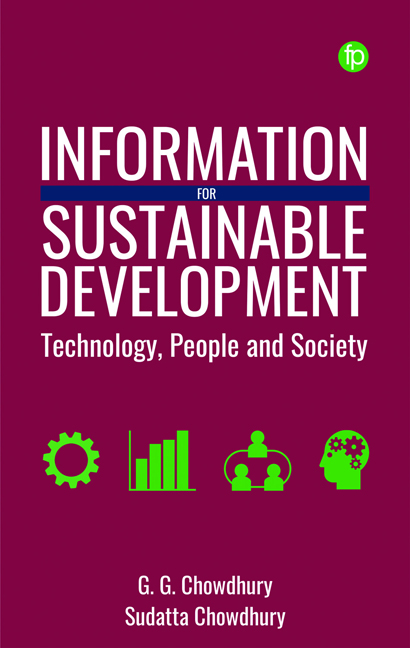Book contents
- Frontmatter
- Dedication
- Contents
- Figures
- Tables
- About the Authors
- Introduction
- 1 Data, Information, People and Society
- 2 Information and the Sustainable Development Goals
- 3 Sustainable Development Goals: Targets and Indicators
- 4 Data, Information and Progress in SDGs
- 5 Capacity, Co-operation and Sharing of Data for SDGs
- 6 People and the SDGs: the Digital Divide
- 7 People and the SDGs: Access to Data and Digital Skills
- 8 Information Skills and the SDGs in Everyday Life
- 9 Information, Education and Sustainable Development
- 10 Research and Development Around the SDGs
- 11 Information Education, Research and Professional Developments Around SDGs
- References
- Index
4 - Data, Information and Progress in SDGs
Published online by Cambridge University Press: 13 April 2024
- Frontmatter
- Dedication
- Contents
- Figures
- Tables
- About the Authors
- Introduction
- 1 Data, Information, People and Society
- 2 Information and the Sustainable Development Goals
- 3 Sustainable Development Goals: Targets and Indicators
- 4 Data, Information and Progress in SDGs
- 5 Capacity, Co-operation and Sharing of Data for SDGs
- 6 People and the SDGs: the Digital Divide
- 7 People and the SDGs: Access to Data and Digital Skills
- 8 Information Skills and the SDGs in Everyday Life
- 9 Information, Education and Sustainable Development
- 10 Research and Development Around the SDGs
- 11 Information Education, Research and Professional Developments Around SDGs
- References
- Index
Summary
Introduction
As discussed in Chapter 3, several Indicators have been proposed for the 169 Targets for the 17 SDGs, and consequently different types of metadata, terminologies and guidelines have been developed for gathering and sharing of the relevant data. However, it is evident that given the diversity of the SDGs and their associated Targets, the Indicators are also quite diverse. Given the fact that every country in the world is required to gather data for measuring success in the diverse set of SDG Targets, it is quite evident that the Indicators are based on the established measurement methods and data availability – in particular, time series – and data consistency (Spangenberg, 2019).
This chapter discusses different SDG Indicators, with some examples to demonstrate the diverse sets of data required for measuring success. Achievements of success in different SDGs are also discussed and appropriate sources for full reports on achievements in the SDGs are also provided for the further understanding of the reader. Specific challenges associated with data quality, data completion, data aggregation and so on are also discussed, to demonstrate how data and information form the foundation of the SDGs and their Targets. This chapter also discusses various challenges associated with data collection, data sharing and use for some Indicators. The differences amongst countries and regions in terms of data availability vis-a-vis achievements in specific SDG Targets are also discussed. The discussions in this chapter demonstrate the needs for co-operation and collaboration at inter - national level, and also the need for understanding of various social and human issues that are associated with data collection, data sharing and data use.
Metadata and the FAIR principles
The FAIR (Findable, Accessible, Interoperable, and Reusable) data principles were proposed in 2016 to promote data sharing (Wilkinson et al., 2016). These principles have since been adopted by research institutions worldwide in order to support knowledge discovery and innovation, as well as data and knowledge integration, and to promote sharing and reuse of data. The FAIR principles help data and metadata to be machine-readable, supporting new discoveries through the harvesting and analysis of multiple datasets (CGIAR, n.d.).
- Type
- Chapter
- Information
- Information for Sustainable DevelopmentTechnology, People and Society, pp. 63 - 82Publisher: FacetPrint publication year: 2024

